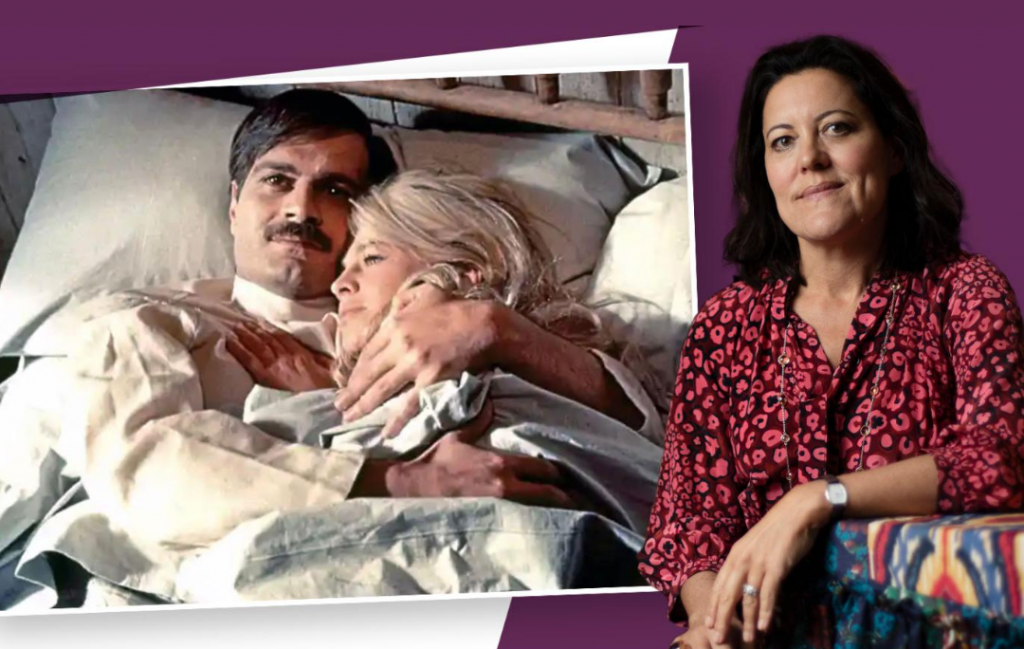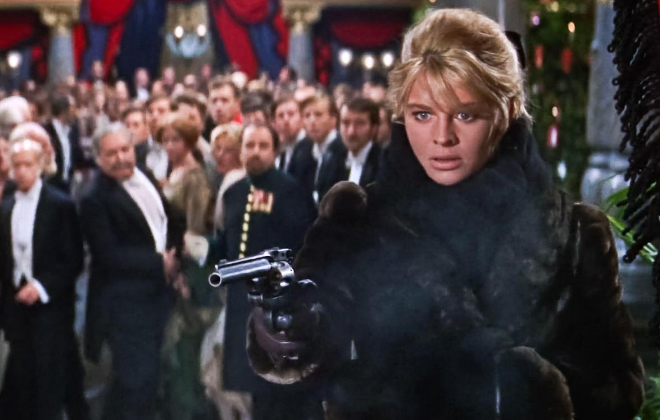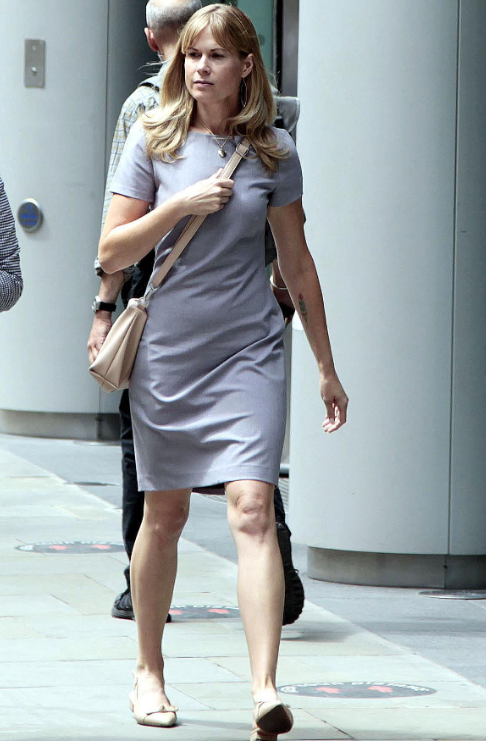
RII SCHROER/ ALAMY

LMKMEDIA/ ALAMY

CHAMPION NEWS
Believing that she had been plagiarised, the great-niece of Boris Pasternak went to court. The case may cost her £2 million.
How would you feel if the past three years of your life had been dedicated to fighting a legal case most people had implored you to drop; if you ignored them and went to the High Court, where your “soul-crushing, blistering” experience in the witness box left you “suicidal’’? Then three months later you learnt you had lost, leaving you with a likely bill of £2 million, it has been reported?
“I feel so proud, I feel upbeat. This is a story of immense courage. It’s been the most harrowing experience, but I don’t regret it,” says Anna Pasternak, great-niece of the literary giant Boris Pasternak, who last week learnt that she had lost (most of) her copyright claim against the publishing behemoth Penguin Random House (PRH). “If we took the money, which is the most eviscerating factor, out of the equation, I’d do the whole thing again. I have been through some very dark moments. During the trial clumps of my hair fell out. I lost 1.5kg in a week. I was being physically sick.
“For 48 hours afterwards I felt suicidal — what the hell have I done? I’ve had trauma counselling for my witness box experience. I feel gut-wrenching horror about the financial stress this has put upon my family. But I haven’t had a nervous breakdown. I’ve shown resilience standing up to an €11 billion organisation. They said they were going to crush me in court, they haven’t. That’s my truth.”
Previously best known for ghostwriting James Hewitt’s 1994 memoir Princess in Love, about his affair with Princess Diana (more of which later), Pasternak had claimed that parts of her 2016 non-fiction book Lara: The Untold Love Story and the Inspiration for Doctor Zhivago had been copied by the American author Lara Prescott for her bestselling 2019 novel The Secrets We Kept.
The High Court ruled that Prescott had not copied the most important sections Pasternak alleged. “I always knew the main body of substance [of the claim] was a gamble,” she shrugs. “In Suzie Miller’s play Prima Facie they talk about truth and legal truth. A very experienced KC asked me, ‘Why are you doing this?’ I said, ‘Because I want the truth.’ He said, ‘You never go to the law for the truth.’ Now I understand that, but in my naivety I didn’t.”
Yet Pasternak, 55, still claims partial victory because the judge supported her “translation claim” — a paragraph from a French book, the translation of which she had commissioned and therefore owned, which was quoted almost word for word by Prescott in her novel. “OK, it’s only minor, but that’s still infringement.”
He also rejected PRH’s assertion that as non-fiction Pasternak’s work had no intellectual copyright and therefore could not be plagiarised. “Without recognition of that there would have been a massive victory for Hollywood, they would never have to option a non-fiction book again. So we’re really elated. I have helped clarify the law with this bit of case law. But everyone seems to be missing the point and is reacting as if I just blithely gambled this money away.”
Some may still view such fighting talk as Liz Trussesque delusion. But, having known Pasternak since I interviewed her about Lara (the book, not Prescott), I understand, and admire, her passionate and uncompromising nature. From a family of academics, she was educated at St Paul’s Girls’ School and the University of Oxford, where she hung out with the likes of David Cameron and Boris Johnson. But her “gilded” life ended at 21, when her parents went bankrupt then divorced. “From that moment I had nothing in common with my cosseted peers. They couldn’t understand the pain I was in.”
“A friend calls me a toff activist, and I know what he means — although I appear very establishment, if I see injustice I cannot walk away. I never choose the easy option. I could have spent all my life in the privileged set, married the nice Sloane, gone to the dinner parties. Just as three years ago it would have been so much easier to think: ‘Oh, well, there was a copyright issue, but it’s too terrifying to go to the law.’ ”
Now, sitting in her home near Henley, Oxfordshire, beneath a portrait by Boris of Leo Tolstoy and another of her two dachshunds, she glows with positivity. Learning of the judgment was “bittersweet. I’ve wept copious tears, I’ve been physically sick in the night over the financial stress. We’ve cleaned up all our savings for old age, it’s devastating and heartbreaking. But on my deathbed, I’m going to be incredibly proud I genuinely have furthered the cause to protect non-fiction writers.”
It helps that she and her husband, the new-age psychotherapist Andrew Wallas, who’s known as the “Modern Day Wizard” to his A-list clientele and who believes in the laws of karma — “that what you pay out comes back to you” — were united in their determination.
“Lots of people have said: ‘This is ridiculous, you should never have done this.’ Neither of us agree. Andrew has this aversion to bullies — he was bullied very badly at school, and we feel this is how massive corporations get away with things. They’re so aggressive, they ramp up costs and starve you out. I am so much more privileged than most — there’s no recourse for the ordinary writer or individual. What we have done is heroic.”
All the same, a bill of about £2 million is a staggering price for making a stand. How is Pasternak, who describes herself as a “penniless author” (her family got no royalties from Doctor Zhivago — they went to its Italian publisher Feltrinelli), going to pay it?
“Good question,” she says, laughing nervously. With the help of a £300,000 loan from friends (now repaid, after Wallas took out a second mortgage) and the couple funding the rest they covered their £700,000 costs. “I wouldn’t have done this without a successful husband, but he’s not a multi-multimillionaire.”
The final bill will be decided at a hearing in December, when Pasternak’s team will try to reduce PRH’s costs (incurring more legal bills), as well as learn what she’ll be awarded for her translation claim. “At the moment the finances are terrifying, but Andrew’s resourceful — in a couple of years we will have absorbed it. This kind of stress either splits up couples or unites them.”
Pasternak’s book was about Olga Ivinskaya, Boris’s longtime mistress and muse, and the inspiration for his character Lara, played by Julie Christie in the 1965 Doctor Zhivago film. In 2019 an Irish reviewer alerted her to “striking similarities” in Prescott’s novel, which had received a £2.15 million advance, about the CIA’s attempts to smuggle Doctor Zhivago into Russia after it was banned by Khrushchev.
“It really annoyed me Prescott was saying: ‘This is a story that deserves to be told.’ I was, like, ‘Hang on! I did tell it three years ago, and you told me in person that you’d used my book.’ ” The admission was made at a party where Prescott told Pasternak that Lara had been “an invaluable resource” on which she’d based the Olga and Boris section of her novel.
Yet Prescott didn’t mention Pasternak in her acknowledgements and didn’t give the book its full title (so omitting the pertinent “The Untold Love Story”) in her bibliography. “It felt like identity theft,” Pasternak said in court. “A work that had taken me over two decades, that was part of my DNA and heritage, was being usurped.
“At the beginning this was just between me and Lara Prescott. I never wanted to make money, I wanted to sit down with her. We never wanted to go to trial. With a proper apology and £10,000 I would have been ecstatic.” But PRH lawyers were brought in, so Pasternak summoned her own.
As costs soared and she endured the “mental mindf***” of legal disclosure — including having to send more than 30,000 emails to the other side — she occasionally wobbled. “There were times when I said to Andrew: ‘This is getting out of hand financially.’ But by this point, you’ve invested so much money that even if you stopped you’d have to pay the other side’s expenses, so you’re in this desperate toxic gamble, throwing good money after bad, when you may as well go through with it.”
Still, court was a “blistering” ordeal, with much made of Pasternak’s witness-box admission that, having commissioned an independent review of both books, she hadn’t read Prescott’s, “just flicked through” sections. “I could fully appreciate it came across as odd, but my reason was I could never be impartial. I relied on experts.” She broke down crying at PRH’s assertion that Lara, which she had researched for 20 years, was not “an original work”. “It’s so painful to be told that about the book I’m most proud of in my life.”
If Pasternak, who has a 21-year-old daughter from a previous relationship, was so fiercely protective of Lara it was because its critical praise served as redemption after the mauling of Princess in Love, which she wrote “purely for money”, to support her mother after she lost all the family money in a property scheme. The world not only mocked Princess in Love’s prose (“I defy any hack who has to write 85,000 words in five weeks not to use too many adjectives, which was my worst crime”), but in 1994 couldn’t believe that Diana had had an affair.
“Everyone said I’d made it all up. It took 18 months until [the Martin Bashir interview on] Panorama for them to see I’d been telling the truth. This seems to be my pattern — a sort of emotional suicide. ‘Why has she done this?’ But in time I’m lauded for something I did.”
Characteristically undaunted, Pasternak is now writing her next book, Courting Disaster: The Anatomy of a High Court Trial, to expose the “patriarchal” court system. And she’s determined to establish Lara’s Law, to give “better protection to non-fiction authors”, requiring “writers of historical fiction properly to acknowledge material that they have derived from works of non-fiction”.
“I feel I could die now and this would be my legacy,” she says, still smiling broadly. “There’s something really noble about this.”